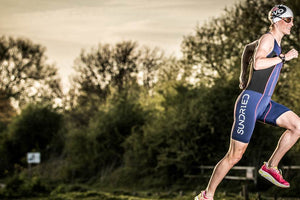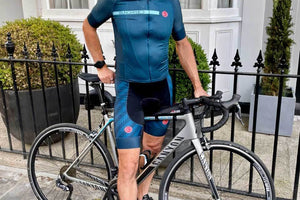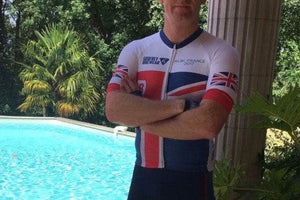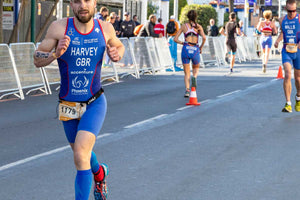
So, you have reached the end of your race season, what do you do now? Are you feeling a little bit lost or have you already started looking ahead to next year's races? Here is a triathlon coach's expert advice on maintaining fitness during the off-season.
The first thing everyone should be doing is having a break. That’s right, a complete stop from training. Cue hushed silence! So many athletes use training as their coping mechanism from stress and work – I know I have and still do use sport like that on occasion. To take that out of your life can leave a massive void, a worry about what you will do with your time, a worry about losing all your hard earned fitness and speed.
The problem with this is twofold. Firstly, without a proper solid break from training or physical stimulation, your body can’t have a full recovery and reset. Most endurance athletes train most days (if their work/family/life schedule allows), if not twice a day, so taking a few days of doesn’t cut it. Time for your body to recharge and repair is essential. On top of this, your brain needs a rest. If you have a particular goal that you want to work towards each year – whether it be a particular race (of any distance), or a PB – then hopefully you have ramped up your efforts towards that goal and hopefully you achieved it. But to have that ramp up in intensity and effort, you have to have some down time too. If you don’t feel like you need that downtime, then chances are you’ll find out at a later point that you did need it and you’ll have a period of low motivation.

Take at least 2 weeks, if not 3, of doing no training whatsoever. Just stop. Take time to spend with friends, family, socialising. Two or three weeks will not lose you all your fitness. But it will have you ready and raring to do something. After that period of proper time off, have a couple of weeks to a month of what you may call 'play'. Do “stuff”, but it’s not training. Don’t worry about your watch or your speed. But if you feel like going and running – go run. Leave the watch at home and focus on enjoying the experience. Try something different – maybe climb, mountain bike or row. All of this is about having fun, about being active and maybe building a little bit of fitness without any worry, any focus, keeping it all light. The great thing with play is that you might develop extra skills that can help your primary sports.
Then it’s time to work out what you are doing for the year ahead and what you need to be doing now to aid and assist that. Unless you’re planning on doing an Ironman or marathon in February/March, you don’t need long training sessions (which is good when the weather is horrible and dark!)
You can use the winter to start changing habits and help toward your end goal. Do you keep putting off improving your swimming? Now’s the time with no stress or races immediately round the corner. Do you keep getting run niggles? Get your running checked out. Use the time you have effectively, get things looked at now and you can start your training year with the best possible habits before you start doing more and working harder.

Along with technique and skill retraining, the other thing that can be of real benefit is starting to build strength work into your programme. I am a massive believer in doing something for strength all year round – it doesn’t have to be in a gym, although if you can get to a facility it will add benefits because of the extra resistance you can hopefully incorporate.
The gym is a scary place for many endurance athletes who would rather be outside, worry about being weak, and have fears of getting “bulky”. Let's deal with each of these in turn.
1) The less fun element, or being away from what you are good at – if you have a good PT, or even look online, you should be able to work out or find a programme that is fun, motivating and enjoyable. That doesn’t mean it is easy, but in the same way your swim or run training can vary, so can work in the gym. It’s not a one size fits all, and should certainly be adaptable to you.
2) Worries about being weak – compared to whom? Being the gym is the same as going out running, or being in the water. We notice other people while we’re out training – but we don’t pay huge attention. When you’re in the gym it’s the same – someone may notice that you’re there, but they aren’t going to be staring at your form or how much weight you are pushing. Besides, the reason you (and anyone else) is doing your training is to get better. Take a deep breathe and focus on yourself.
3) Being bulky/putting on weight – a massive fallacy. To put on bulk and muscle you need to eat a hell of a lot, and you need to work super hard in the gym for a concerted period of time. If your food is balanced (ie calories in v calories out) then you will not be physically able to put on weight or size. It’s a physical and biological impossibility, against the laws of nature.

Just because you might start getting in the gym, that doesn’t mean you need to spend hours there. One or two sessions of 45 minutes to an hour a week are plenty. And this can fit in nicely with reduced other training while you build into a rhythm. If you’re someone who does two sessions of each per week, a gym session or two hopefully can slot in nicely.
If time is an issue, you could substitute one of your other sessions, or maybe your long ride through the winter (rather than going out and riding in the wet for 3 hours, you could do a 45-minute gym session and get more bang for your buck). Or you could do body weight exercises at home to reduce the time pressures on yourself.
Your training through the winter should reflect that there’s nothing immediate coming up for you. Enjoy your training, and try not to stress about it too much. If you wake up in the morning feeling unmotivated – take the morning off. It doesn’t have to become a habit, but if you remove the mental stress now, you’ll feel much better about getting your head down when the sun comes out.
Keep the sessions short and punchy so that you can get in and get done – and then maybe go to the Christmas party or that catch up with friends you haven’t seen in six months.
Volume is easy to add back into training; the body generally absorbs that better, so go for the quick hits, a turbo or spin class to get the legs moving, a short trail run in the dark (a group I used to run with called it Blair Witch Running!), or a club swim session for company – and then be done with it. Use races as fun training sessions – whether that be your local off-road 5-miler or entering masters swimming.
Training in the winter can be a challenge, mentally as much if not more so than physically. Give your body and brain a change, some fun, and tick over. Remove the stress and have fun. You’ll be thankful in the new year.
About the author: John Wood has been involved in swimming for the last 25 years and has competed at National and International levels. He is now a triathlon coach with Bristol and District Triathlon club, Flying Monks Triathlon, and North Bristol Tri, training adults, children and para athletes.










